It usually starts with a deadline.
Your dev team is stuck. Your backend guy just left. The front-end MVP is due in a week.
You start looking for anything that can reduce repetitive work without burning more budget.
That’s when you come upon the trend: AI coding tools like GitHub Copilot and Cursor.
Now you’re asking: Cursor vs Copilot: which one is better for your team?
As a team that has delivered AI-powered products, scalable SaaS tools, and enterprise systems across fintech, logistics, healthtech, and eCommerce, Seven Square has seen how the right tools can speed things up.
Here in this blog, you can see where Cursor and Copilot shine, where they struggle, and which one is the better AI coding assistant for you.
So, if you are trying to get a complete comparison between Cursor vs GitHub Copilot, then you are at the right place.
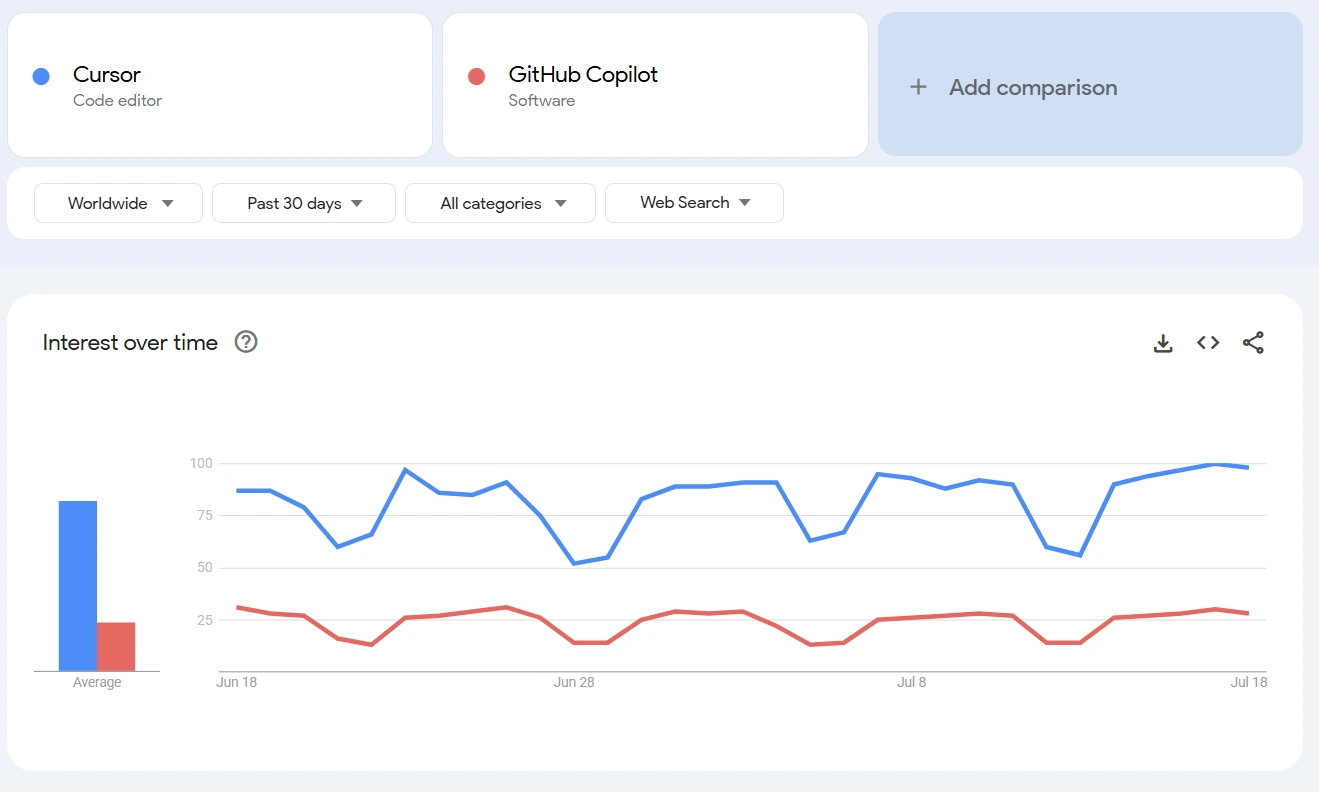
Source: Google Trends
What is GitHub Copilot?
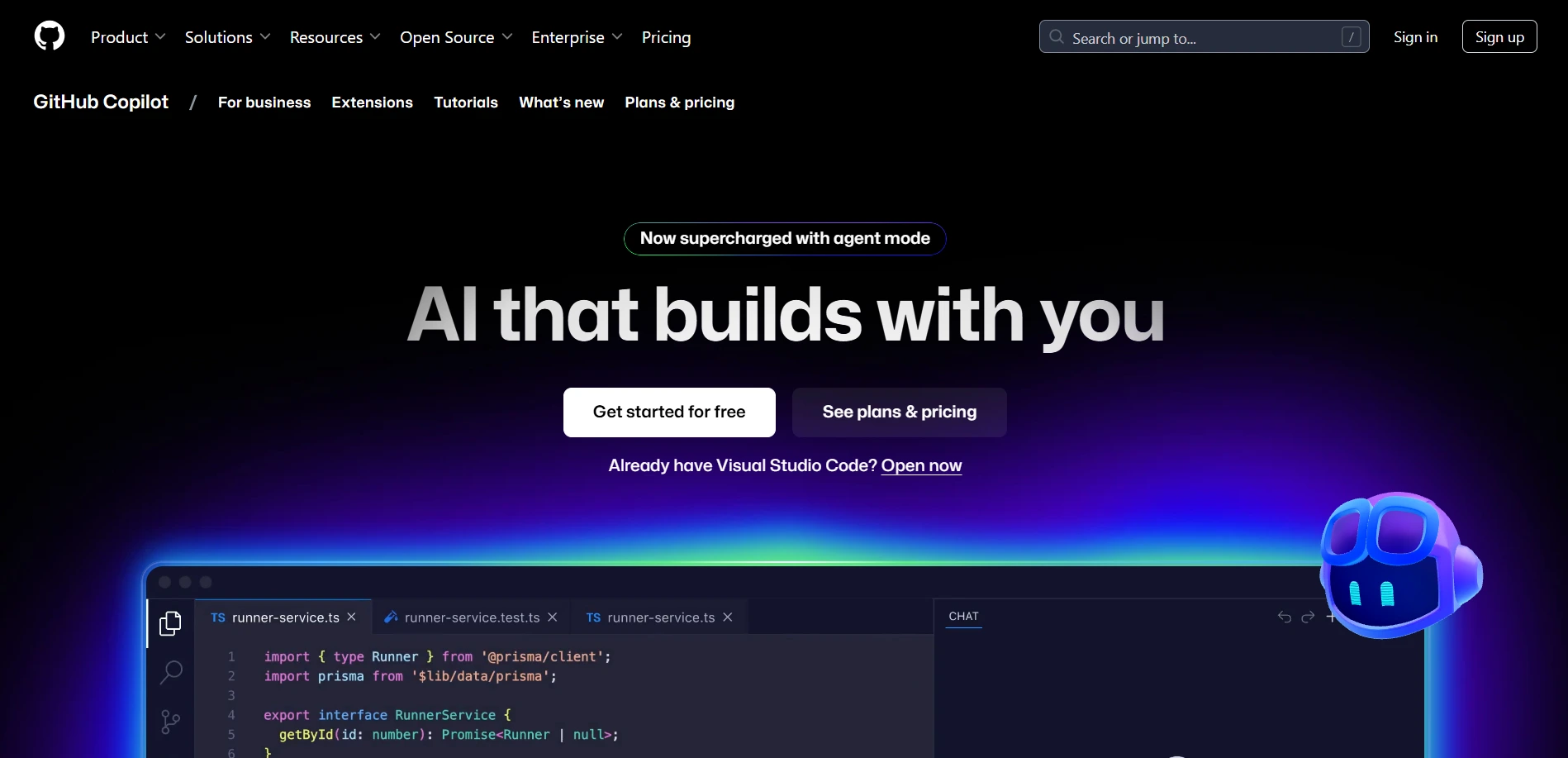
GitHub Copilot, powered by OpenAI Codex, is an AI code assistant that lives inside your IDE, usually VS Code or JetBrains.
It autocompletes code, writes functions, and can even generate unit tests.
At Seven Square, our front-end devs often use Copilot to rapidly build UI components, quickly scaffold CRUD features, or accelerate repetitive backend boilerplate.
It’s ideal for:
- Small, fast-moving teams.
- Projects are in the MVP or prototype stage.
- Developers who love keyboard-first workflows.
If your question is: Should I use Copilot for coding quick features or MVPs? The answer is yes.
What is Cursor?
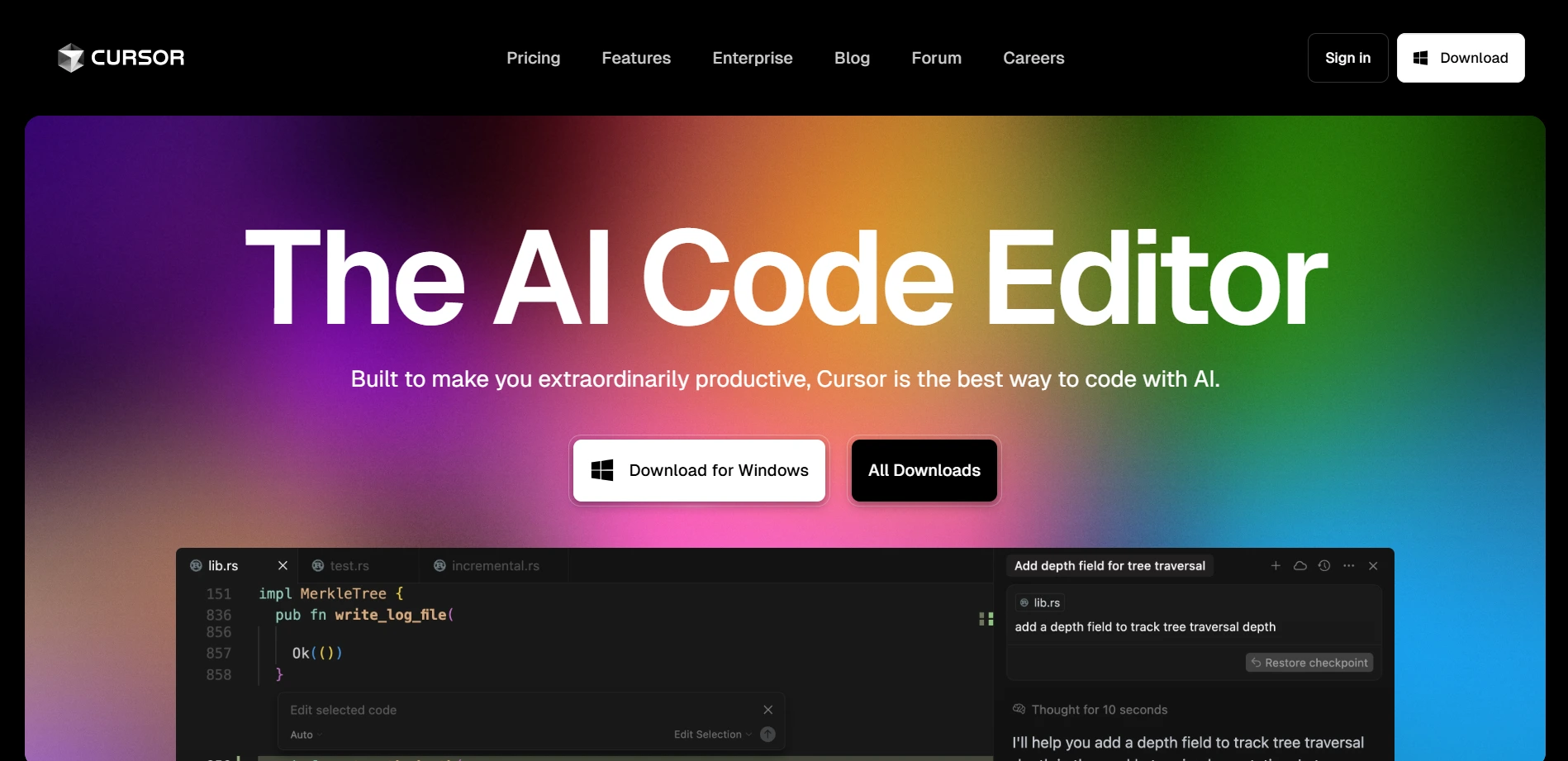
Cursor is a next-generation AI coding tool, an IDE simplified around AI-first workflows.
It uses GPT-4 and Claude 4 under the hood, but the magic is in how it understands your entire codebase.
Think of Cursor not just as an autocomplete engine, but as a co-pilot that can:
- Refactor multiple files at once.
- Understand relationships across services.
- Help you chat with your codebase.
At Seven Square, Cursor is our go-to when working with backend APIs, ERP systems, or modular enterprise platforms. It scales better than Copilot.
Cursor vs Copilot: Features Comparison
Before we explore the detailed comparison of Cursor vs Copilot, remember Copilot is an Extension while Cursor is an Editor.
| Feature | Cursor | GitHub Copilot |
|---|---|---|
| Code Completion | Yes (GPT-4 + Claude) | Yes (GPT-4/Codex) |
| AI Code Search | Yes | No |
| Chat with Entire Codebase | Yes | Limited |
| Inline Suggestions | Yes | Yes |
| Multi-line Code Generation | Yes | Yes |
| Code Explanation | Yes | Limited |
| Refactoring Support | Strong | Weak |
| Pricing | $20/month (Pro) | $10/month (Individual) |
| Supports VS Code Extensions | Yes | Yes |
| Enterprise Access | Early-stage | Mature |
We’ve tried both tools on real-world projects.
Copilot works great when you want to speed up boilerplate code.
Cursor is best when your project has context, complexity, and a large codebase.
Cursor vs GitHub Copilot for Developers
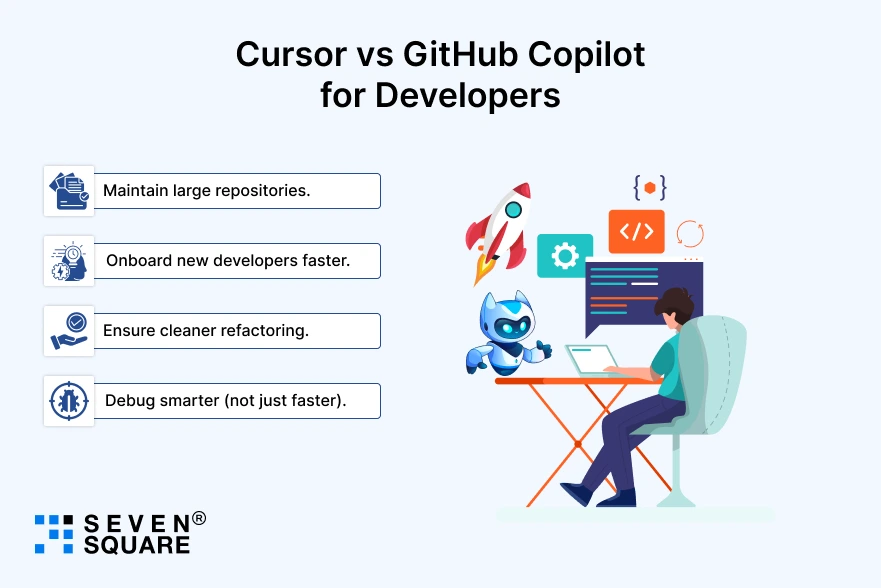
If you’re an individual developer working on quick projects or personal apps, GitHub Copilot gets the job done.
It offers fast completions and familiar integration into your existing IDE.
But if you’re a product manager or engineering lead looking to:
- Maintain large repositories.
- Onboard new developers faster.
- Ensure cleaner refactoring.
- Debug smarter (not just faster).
Cursor gives you an advantage, especially when handling multiple microservices, legacy code, or scaling teams.
At Seven Square, our development team uses tools like these to deliver clean, working code faster.
But we always test, iterate, and implement where they give real ROI.
Cursor or Copilot: Pricing Comparison
Here’s what most founders overlook: time-to-code isn’t the only cost. Clarity, maintainability, and onboarding matter too.
| Tool | Cost/Month | Value for Teams |
|---|---|---|
| Copilot | $10 | Best for solo devs or tight budget MVPs. |
| Cursor Pro | $20 | Better for scaling teams, pair programming, and AI-guided workflows. |
When our clients in healthtech and SaaS needed quick iterations but also scalable architecture, we often leaned into Cursor, despite the higher price tag, because the long-term refactoring cost was lower.
Cursor vs Copilot Code Completion Speed
This is where Cursor quietly wins.
Because it integrates deeply with your codebase, it understands context better. This leads to:
- Fewer wrong completions.
- Smarter suggestions across files.
- More useful autocompletion.
In our real-time tests, Cursor completions were slower by a second or two but significantly more accurate. That saves hours in review.
If you’re tired of fixing Copilot’s “almost right” suggestions, you’ll appreciate Cursor’s deeper contextual awareness.
Learn more about the best AI coding assistant tools.
Cursor vs Copilot: Features That Actually Matter (and What to Watch Out For)
At Seven Square, we’ve implemented both GitHub Copilot and Cursor AI on active client projects from scrappy SaaS MVPs to complex logistics and fintech systems.
Here’s what we’ve learned about their real-world features, benefits, and limitations.
1. Cursor AI: The Power Tool for Complex Dev Workflows
Cursor is a full AI-native IDE built specifically for developers who deal with context-heavy environments.
What makes Cursor stand out:
- AI search and project-wide understanding: It actually “reads” your whole codebase, not just the file you’re in.
- Chat with your code: You can ask why a function exists, what a module does, or how to refactor safely.
- Smarter refactoring: Modify logic across files, not just snippets.
- Editor-level integration: Cursor behaves like a standalone IDE based on VS Code but deeply tuned for AI workflows.
Downsides? It’s a newer product, so you might miss some plugins or themes.
2. GitHub Copilot: Fast, Familiar, and Frictionless
Copilot is like the helpful sidekick, which is quick, responsive, and good with boilerplate.
Where Copilot excels:
- Speed: Super-fast completions, great for repetitive patterns and short methods.
- IDE Compatibility: Works with most modern IDEs and editors out of the box.
But here’s the catch:
- It lacks a deep understanding of your project.
- It doesn’t help much with debugging or explaining code.
- Refactoring is manual, but you’re still doing the heavy lifting.
For solo developers or teams building small apps, GitHub Copilot can save hours. But once you scale or deal with real complexity, it starts to show limits.
Should I Use Cursor or Copilot for Coding?
Here’s a quick decision guide:
| Use Case | Recommended Tool |
|---|---|
| Solo dev, small project | Copilot |
| Enterprise product or SaaS scaling | Cursor |
| Building an MVP fast | Copilot |
| Maintaining legacy code | Cursor |
| Hiring new developers frequently | Cursor |
| Looking for fast, no-frills code help | Copilot |
At Seven Square, we work with both. But for client projects that require deep codebase understanding and long-term maintainability, Cursor wins most of the time.
Why Founders Choose Seven Square for Smarter AI-Driven Development?
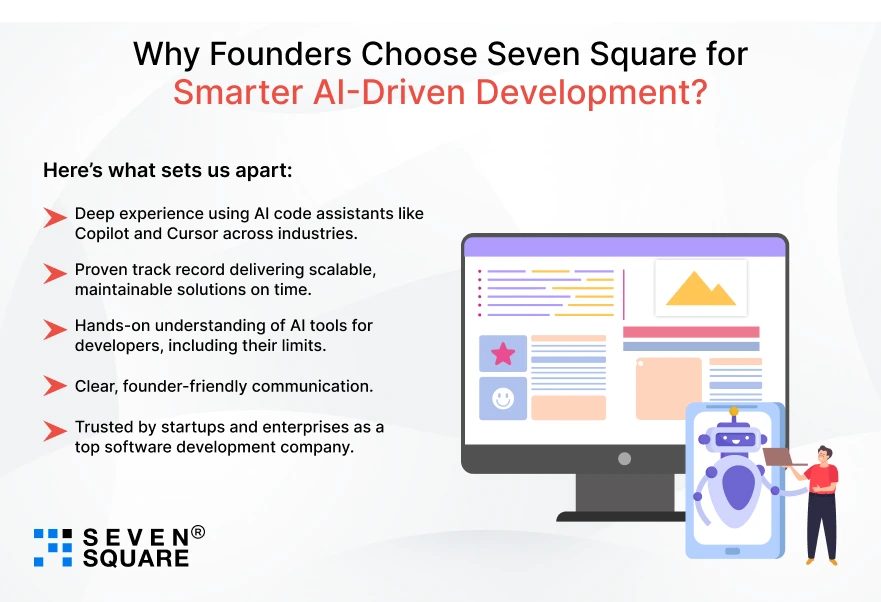
At Seven Square, we build and deliver real-world products across fintech, logistics, eCommerce, healthtech, and SaaS.
When we talk about the best AI coding assistant tools, we ensure to showcase that they can handle pressure, tight deadlines, legacy codebases, & MVP launches.
Whether it’s picking between Cursor vs Copilot or designing a custom AI coding workflow, we customize every stack to your actual use case.
Here’s what sets us apart:
- Deep experience using AI code assistants like Copilot and Cursor across industries.
- Proven track record delivering scalable, maintainable solutions on time.
- Hands-on understanding of AI tools for developers, including their limits.
- Clear, founder-friendly communication.
- Trusted by startups and enterprises as a top software development company.
We believe tools are only as valuable as the team using them.
Want a Complete AI Solution? Contact Us Now!
What’s the Final Verdict: Copilot vs Cursor?
If you’re choosing between Cursor vs GitHub Copilot, don’t look for “which is better.” Ask instead:
“Which one solves the kind of problem I’m facing?”
That’s how we help founders at Seven Square make smart tech bets. Tools are only as good as the workflow they help.
- Want to move fast and ship a feature? Copilot.
- Want to scale responsibly, clean up tech debt, or write better code with fewer bugs? Cursor.
Both tools are powerful. But only one might be right for your current stage.
FAQs
- The key difference is that GitHub Copilot is an AI code completion tool integrated into IDEs like VS Code, while Cursor is a standalone AI-native code editor built on GPT-4 and Claude 4.
- Cursor provides better project-wide context and smarter refactoring, whereas Copilot focuses on fast, inline suggestions.
- Cursor AI is better for large & complex codebases because it allows developers to chat with the entire project, & explain logic.
- GitHub Copilot lacks this project-wide context, making Cursor more effective for enterprise or legacy systems.
- From our experience, Cursor generates more accurate and context-aware code, especially for complex logic and refactoring.
- Copilot is faster for small snippets but often suggests “almost right” code that needs cleanup.
- Some top AI coding assistant tools besides Copilot and Cursor include Q Developer by AWS, Tabnine, Replit Ghostwriter, and Windsurf.
- However, Cursor and Copilot remain the top choices for GPT-based AI developers in 2025.